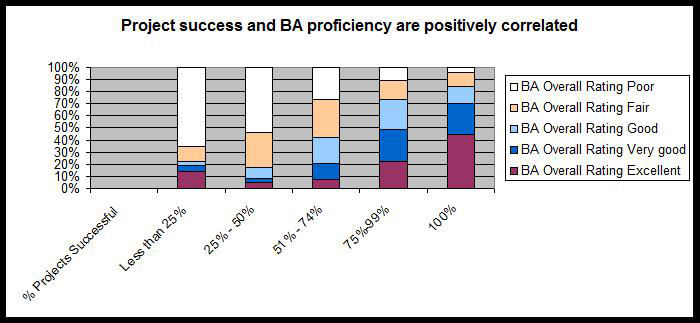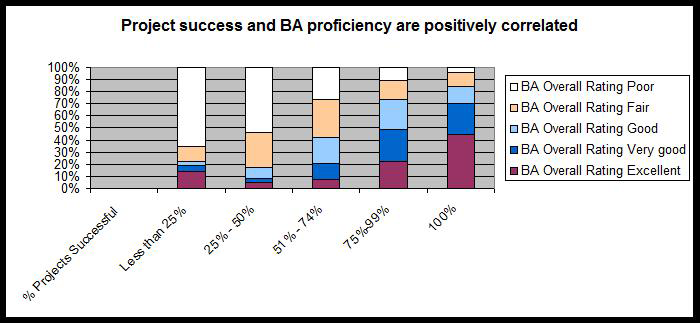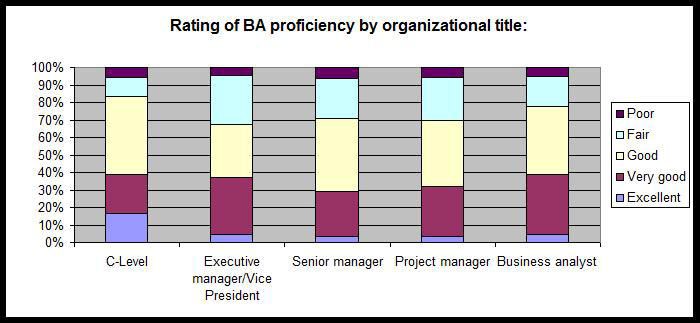
Why Good Isn’t Good Enough: The Global State of Business Analysis, Part 1
Organizations around the globe are using business analysis (BA) to define requirements and determine courses of action and solutions to help them achieve their goals. BA activities are critical to projects and organizational success, but success requires standards of practice and adherence to the BA discipline. How good are organizations at practicing BA? Are they realizing its full potential?
In September 2011, ESI International conducted a survey of more than 1,600 respondents with varying titles within organizations worldwide to ask about their experiences and perceptions of business analysis.
This global study seeks to determine the actual business impact that business analysis has on organizations, and examines its current state by inquiring into BA practices, trends, challenges and applications of the business analysis discipline.
Respondents represent a broad spectrum of industries, including the public sector, when answering questions about their organizations, including the following:
- How do they rate the proficiency of their overall business analysis function?
- How do they rate the proficiency of their individual business analysis activities?
- What are the key success factors for their projects?
We found that proficiency in business analysis can vary among activities and among organizations, but respondents are essentially satisfied with their business analysis practices and outcomes. While people believe their organizations’ business analysis practices are “good,” analysis shows there is room for improvement, indicating that “good” isn’t necessarily “good enough.”
Gaps exist in certain business analysis areas, such as:
o Proficiency in BA activities
o The practice of BA at the enterprise level
o Levels of experience
o Achieving certification in BA
Key Findings
The survey revealed some key findings:
- Respondents view business analysis as crucial to successful projects and in fact, the overall rating of business analysis functions is highly related to project success rates.

- Contradicting external evidence of findings of project results, more than 90 percent of respondents consider more than half their projects to have been successful over the last three years. 68 percent of respondents consider 75 percent or more of their projects to have been successful.
- Middle management is more critical of the business analysis function than senior management, yet business analysts themselves also see room for improvement.

- Respondents at all levels of the organization rated the most important success factors of their projects as
- customer satisfaction: 81 percent
- on time completion: 62 percent
- on budget delivery: 52 percent
- product quality: 46 percent
- Survey results indicated that business analysis is not viewed as being impactful to business results. Only 22 percent of respondents said profit impact is an important success factor for business analysis. Just 15 percent said acquisition and retention of customers, and 4 percent said market share are important success criteria for business analysis.
- Just under 20 percent of total respondents said that they are responsible for enterprise analysis, and only 7 percent said that they spent most of their time on enterprise analysis. Among BAs, only 26.3 percent are responsible for enterprise analysis and 6.5 percent said that they spent most of their time on enterprise analysis.
- Nearly half of BA practitioners have five years or less of business analysis experience; of them, 15 percent have less than two years of experience. 21 percent have six to nine years’ experience and 30 percent have 10 years or more.
- 37 percent of organizations have increased their number of BA positions in the last two years, and 27 percent expect to increase them over the next two years.
- The key challenges faced in business analysis are communication (47 percent) and cross-functional collaboration (46 percent).
- BA certification is not widespread in organizations, with only 2.5 percent of total respondents who said they have their CBAP® certification, and 6.4 percent of BA respondents who have their CBAP® certification. 1.8 percent of total respondents and 1.0 percent of BA respondents said they have a SCRUM Master certification.
Conclusions
Organizations are using business analysis to win the battle, but they may not win the war
The survey shows respondents make the connection between business analysis proficiency and project success, but that a disconnect still exists in recognizing the impact of business analysis and successful projects on business value and results. This could likely be the result of individuals’ granular focus on projects without seeing the Big Picture. In addition, BAs do not always understand their impact on the organization from a financial or business perspective since they often conduct task-oriented work with stakeholders who may also lack an overall perspective.
Both business analysts and project managers need to become more involved at the enterprise level. Not surprisingly, enterprise analysis ranks lowest in proficiency among business analysis activities. Without an enterprise analysis perspective, BAs lack the connection between what they are doing and why they are doing it. So while they may be winning the project battle, they don’t have the enterprise-wide perspective to win the war.
Most believe “good” is good enough
The majority of respondents believe that their business analysis competencies are good to excellent, and that 75 percent or more of their projects over the last three years were successful. However, since real-world evidence indicates otherwise, organizations may be in need of a reality check.
Business Analysis in demand despite inexperience and immaturity of the profession
The survey shows a relatively large population of less experienced practitioners of business analysis, with nearly half reporting five years or less of experience. The still maturing nature of business analysis has numerous implications for organizations since it impacts performance, including the potential for business analysts to work from an enterprise perspective, handle challenges within their discipline and their organizations, and achieve a level of proficiency and success equated with more seasoned professionals.
Despite this, organizations recognize the critical importance of requirements management and business analysis, with survey results showing an increase in the number of business analyst positions in the last two years, and an increased number of business analyst positions projected over the next two years.
Certification, tools lacking to support the business analysis discipline in organizations
Establishing business analysis as an organizational discipline may be undermined by a lack of the supporting elements of the profession. The survey results show that business analysis certifications are held by a very small percentage of those practicing the discipline, unlike its project management counterpart, the Project Management Professional (PMP®) certification. Just as surprising may be the small percentage of SCRUM Master certifications, given the importance of Agile as an explosive development methodology. In addition, business analysis tools are not as prevalent as might be expected given their potential enhancement to the business analyst’s output, with more than one-third of respondents reporting using no dedicated tools at all.
Summary
In a competitive and economically challenging environment, there is always room for improvement—in business analysis, as well as in other areas. Organizations that allow themselves to stand still will be left behind. Raising expectations for and the proficiency of business analysis in organizations is key to helping organizations realize the full potential of the discipline and maximize BA’s business impact.
Don’t forget to add your comments below.
Part 2 of “Why Good Isn’t Good Enough: The Global State of Business Analysis” will examine the survey recipients’ responses to the survey questionnaire.
Glenn R. Brûlé, CBAP, CSM, Executive Director of Global Client Solutions, ESI International, brings more than two decades of focused business analysis experience to every ESI client engagement. As one of ESI’s subject matter experts, Glenn works directly with clients to build and mature their business analysis capabilities by drawing from the broad range of learning resources ESI offers. A recognized expert in the creation and maturity of BA Centers of Excellence, Glenn has helped clients in the energy, financial services, manufacturing, pharmaceutical, insurance and automotive industries, as well as government agencies across the world.